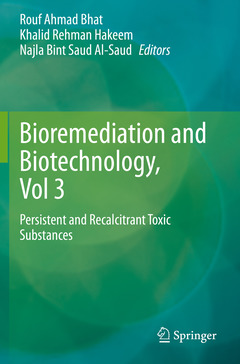Description
Bioremediation and Biotechnology, Vol 3, 1st ed. 2020
Persistent and Recalcitrant Toxic Substances
Coordinators: Bhat Rouf Ahmad, Hakeem Khalid Rehman, Saud Al-Saud Najla Bint
Language: English
Publication date: 07-2021
360 p. · 15.5x23.5 cm · Paperback
Publication date: 07-2020
360 p. · 15.5x23.5 cm · Hardback
Description
/li>Biography
/li>Comment
/li>
Dr. Khalid Rehman Hakeem (PhD) is Professor at King Abdulaziz University, Jeddah, Saudi Arabia. After completing his doctorate (Botany; specialization in Plant Eco-physiology and Molecular Biology) from Jamia Hamdard, New Delhi, India, in 2011, he worked as a lecturer at the University of Kashmir, Srinagar, for a short period. Later, he joined Universiti Putra Malaysia, Selangor, Malaysia, and worked there as Postdoctorate Fellow in 2012 and Fellow Researcher (Associate Professor) from 2013 to 2016. Dr. Hakeem has more than 10 years of teaching and research experience in plant eco-physiology, biotechnology and molecular biology, medicinal plant research, plant-microbe-soil interactions as well as in environmental studies. He is the recipient of several fellowships at both national and international levels; also, he has served as the visiting scientist at Jinan University, Guangzhou, China. Currently, he is involved with a number of international research projectswith different government organizations. So far, Dr. Hakeem has authored and edited more than 50 books with international publishers, including Springer Nature, Academic Press (Elsevier), and CRC Press. He also has to his credit more than 100 research publications in peer-reviewed international journals and 60 book chapters in edited volumes with international publishers. At present, Dr. Hakeem serves as an editorial board member and reviewer of several high-impact international scientific journals from Elsevier, Springer Nature, Taylor and Francis, Cambridge, and John Wiley Publishers. He is included in the advisory board of Cambridge Scholars Publishing, UK. He is also a fellow of Plantae group of the American Society of Plant Biologists, member of the World Academy of Sciences, member of the International Society for Development and Sustainability, Japan, and member of Asian Federation of Biotechnology, Korea. Dr. Hakeem has been listed in Marquis Who’s Who in the World, since 2014–




